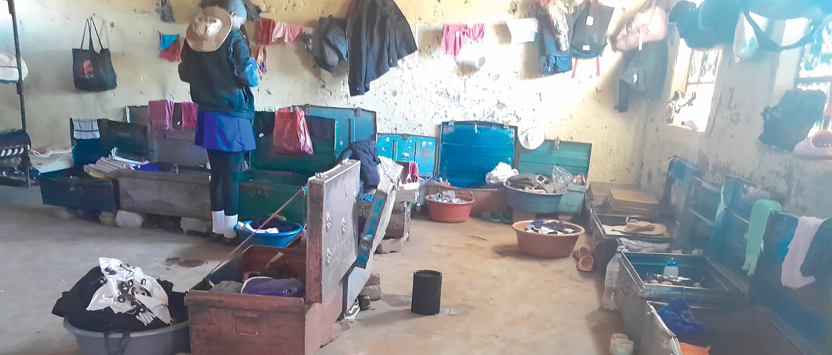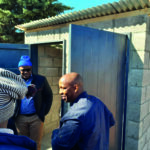When parents bid farewell to their daughters and entrust them to a boarding school, they carry with them a hopeful belief that their children are going to a place where learning thrives, where discipline is instilled, and where dormitories offer a second home, perhaps not luxurious, but certainly safe, clean, and conducive to growth.
At St. Sebastian High School in Mohale’s Hoek, however, this hope is unravelling.
The girls’ dormitories, a vital cornerstone in the boarding experience, are in a dire state. An investigation by Newsday into these living quarters uncovered conditions that challenge the very idea of dignity and safety, let alone learning.
Students are expected to live and continue studying in their dormitories, especially after school hours. Multiple students who spoke on condition of anonymity for fear of victimisation described the conditions as far from suitable for either learning or healthy living.
Upon approaching the dormitories, a strong, pervasive odour immediately assaults the senses. The smell is suggestive of overcrowding and a clear lack of regular cleaning.
It is difficult to imagine how students are expected to concentrate on their studies in such an environment.
Compounding these issues is the absence of electricity. Students are confined to dark rooms filled with an unpleasant smell, a setting hardly conducive to academic focus or mental well-being.
Each dormitory is crammed with bunk beds stacked one above the other. The mattresses and blankets appear unwashed for extended periods, adding to the foul atmosphere. Their dark, unidentifiable colours only underscore the apparent neglect.
The rooms are cluttered with open trunks propped against the walls, with clothes, socks, underwear, and other personal items spilling out. The walls are dotted with holes where students have hammered nails to hang their uniforms, a makeshift solution in the absence of proper wardrobes.
Communication with parents is another challenge. Students rely on small solar panels to charge their phones, crucial not just for staying in touch with home, but also for conducting schoolwork and research. These personal, often inadequate charging solutions highlight significant gaps in infrastructure.
According to the students, each dormitory houses nearly 30 girls. While they are supposed to clean the rooms on a rotating basis, this system often breaks down, with some students neglecting their duties.
For many, proximity to their classes is the only benefit. But the dire living conditions erode any comfort this might offer.
A student from Quthing voiced her frustration: “There is no privacy. We know dormitories do not offer much privacy, but there should at least be a little.”
Cleanliness, she added, is the most distressing issue. Students frequently suffer insect bites and skin rashes, which they believe stem from the unhygienic environment.
Monaheng ‘Musi, Principal of St. Sebastian High School, acknowledged the poor conditions. “Initially, these were not dorms, they were old classrooms we repurposed to accommodate students from far away,” he explained. “Eighty percent of our students live too far to commute daily.”
He added that the school has employed a caregiver, a “mother” figure, to support the girls in the dormitories. But he admitted that geographical isolation and deep-rooted socio-economic challenges make the situation even more difficult.
The school is severely understaffed, with only five teachers, including the principal, serving more than 175 students. “This makes teaching and learning extremely difficult and compromises education quality,” said ‘Musi.
He noted that more than half the students come from vulnerable families and rely on government grants provided through the Ministry of Youth, Gender and Social Development.
However, these grants are both delayed and insufficient. “Each student receives only M250, which is expected to cover food and someone to cook for them. The school is often in debt. We simply can’t afford to develop our facilities under these circumstances,” he said.
The challenges extend beyond staffing and finances because St. Sebastian High School has no access to electricity.
“For things that require electricity, we use a generator, which sometimes goes for long periods without petrol,” ‘Musi shared. His remarks follow recent government statements declaring electricity a luxury, arguing that many Basotho survive without it, and rejecting calls to zero-rate VAT on electricity to improve affordability.
Adding to his concerns, ‘Musi highlighted the heartbreaking issue of students dropping out due to early marriage or migrating to South Africa in search of employment.
He attributed this to the fact that most of these children are orphans, or their parents have left home for South Africa for jobs and no longer take care of their children, underscoring the profound socio-economic pressures weighing on his students and the community.
Ministry of Education and Training Chief Information Officer Molikuoa Sekhonyana indicated that there are no guidelines within the ministry which specifically speaks on boarding housing.
Sekhonyane said the only guiding principle is the School Health Policy which does not specifically speak about boarding houses but speaks about maintaining cleanliness in general in schools.
She said the issue of cleanliness is looked at the same time when Inspectors from the Ministry visits schools and that is done together with inspecting everything in schools.
Summary
- When parents bid farewell to their daughters and entrust them to a boarding school, they carry with them a hopeful belief that their children are going to a place where learning thrives, where discipline is instilled, and where dormitories offer a second home, perhaps not luxurious, but certainly safe, clean, and conducive to growth.
- The girls’ dormitories, a vital cornerstone in the boarding experience, are in a dire state.
- He added that the school has employed a caregiver, a “mother” figure, to support the girls in the dormitories.

Ntsoaki Motaung is an award-winning health journalist from Lesotho, specializing in community health stories with a focus on sexual and reproductive health and rights, as well as HIV. She has contributed to platforms like “Be in the KNOW,” highlighting issues such as the exclusion of people with disabilities from HIV prevention efforts in Lesotho.
In addition to her journalism, Ntsoaki serves as the Country Coordinator for the Regional Media Action Plan Support Network (REMAPSEN). She is also a 2023 CPHIA Journalism Fellow.







